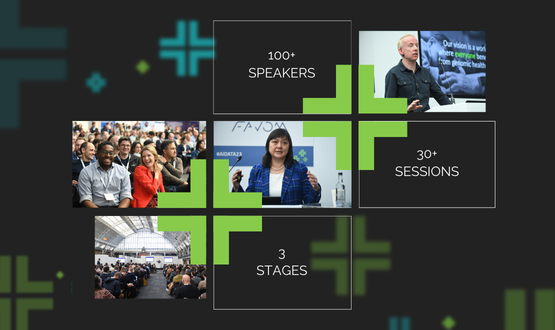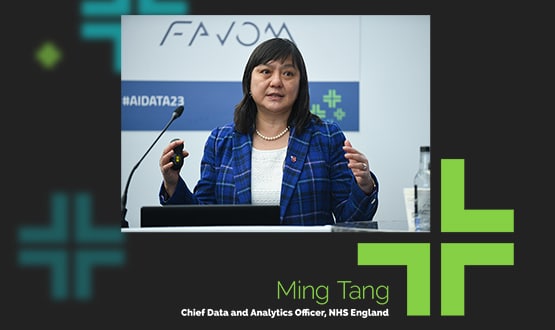AI and Data: Remote monitoring must filter out ‘excess noise’
- 5 October 2023

Generating large volumes of poor quality data wastes clinicans’ time and puts patients at risk, says Elina Naydenova, a speaker at Digital Health’s AI+Data event. By Lizzie Cernik
From checking oxygen levels at home to registering blood pressure readings with a GP, remote monitoring tools in healthcare aren’t new. But they still struggle to provide reliable sources of data for clinicians.
According to Elina Naydenova, CEO and co-founder of Feebris, one of the biggest challenges with remote monitoring, and the reason the tools have yet to be widely adopted, is due to the excess noise it can create in systems. “It generates large volumes of data which isn’t always very accurate,” she explains.
“For example, if you’re moving a lot or wearing nail varnish, or moving your hand too much, measurements of oxygen saturation can change, which may mislead the clinician.” As well as unnecessary intervention and wasted clinical time, poor data also puts patients at risk of missed diagnosis and delayed treatment.
And that’s why Feebris is doing things differently. The firm is creating remote monitoring tools with algorithms that filter out excess noise and provide clinically accurate information for professionals. “We capture a raw signal in real time, and it streams the data, so it can then tell if you’re talking too much, or waving your hand while taking a test,” says Naydenova.
“It’s a bit like having a nurse looking over your shoulder to advise you on how to get the right information. We can then filter that and identify which part of the data is trustworthy, to send to the clinicians.”
Better use of data
If used correctly, she believes that data has the power to revolutionise care in the NHS, freeing up clinical time for one-on-one support they can offer patients.
“One way that remote monitoring data and other forms of AI can support the NHS is by helping us to leverage technology in more intelligent ways,” says Naydenova.
“At the moment there are around 14 million gaps in the workforce across the globe, a figure that will be almost impossible to fill. But these tools have the power to take over more simple processes, saving time and manpower in the long run.” She argues that by training healthcare assistants, carers and even individuals to use these tools, it will simplify the triage process for patients, leading to better outcomes for all.
And she suggests that the technology created by Feebris is especially impactful for more sophisticated devices. “We don’t have enough doctors available to listen to every patient’s chest, for example. By guiding individuals who don’t have clinical expertise, such as carers, to record lung sounds, we can ensure the right data is being recorded and instantly shared with someone who has the clinical expertise to determine the next steps for that patient, as well as any key risk factors.”
Since launching in 2019 in both the UK and global markets, Feebris has expanded rapidly; their technology is currently deployed across 100 sites in primary and secondary care. “During the pandemic we focused less on our global network, but our work in the UK really accelerated as the demand for remote monitoring increased,” says Naydenova.
While she is pleased with the company’s progress, she says the NHS is not ready, yet, to rely on AI technology. “Currently AI is used in radiology in the NHS in relation to images, which are very standardised,” she explains. “But the concept of using AI to augment the detection of deterioration at home is not as established. It will take time to build up trust with NHS services and establish this as a standard of care at scale.”
Evidence supports investment
A recent study by the York Health Economics Consortium shows that for every 1000 people utilising devices and data technology from Feebris, the NHS saves £500,000 due to faster treatment times and lower hospital admissions.
Naydenova believes it’s this kind of data that will demonstrate to organisations the need to invest in AI. “It’s incredibly important that solutions go through clinical testing to ensure they’re accurate and safe for us. I would like to see us get to a point where the testing has been so rigorous, that NHS organisations can order products without needing to do their own pilot testing.”
As trust in the technology continues to build, she hopes that Feebris will become the company that healthcare professionals turn to. “We want to be the NHS partner that takes the organisation away from being a sickness service to a healthcare service.
“High quality AI monitoring tools have the power to help the NHS build prevention services to identify illness before it becomes serious. Not only will that save and improve the life of patients, it will also increase efficiency and save money for the NHS in the long run.”
Naydenova is a speaker at AI and Data, 30-31 October 2023, a new event by Digital Health, the organisers of the market-leading Rewired and Summer Schools. The new event includes a wide-ranging programme of events on two stages: AI and Analytics, and Data and Research.
All sessions are CPD accredited. AI and Data is free for the NHS, public sector, start-ups, charities, education and research. Commercial tickets from £275+VAT. Find out more and register here




